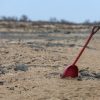
Snow fell throughout the morning as the emergency services evacuated the injured
A major landslide destroyed homes during the night in a village in Norway close to the capital Oslo, leaving more than 20 people missing and 10 injured, police and local media said Wednesday.
Video footage from the scene showed a whole hillside had collapsed in Ask in the municipality of Gjerdrum, 25 kilometres (15 miles) northeast of the capital, leaving homes crushed and buried in dark mud.
Snow fell throughout the morning as the emergency services evacuated the injured and attempted to secure still standing homes, some of which were teetering on the edge of the crater left behind by the slide.
Norway’s Prime Minister Erna Solberg travelled to the village of around 1,000 people on Wednesday and described the landslide as "one of the largest" the country had seen.
"It’s a dramatic experience to be here," Solberg told reporters, adding she was particularly concerned with those still missing.

The view from a Norwegian Air Force 330 Squadron
"The situation is still so unstable with the mud that it’s not yet possible to do anything other than helicopter rescues," she said.
Norwegian media said that 700 people had been evacuated from their homes, while 21 people were unaccounted for.
"We don’t know if these people are in the landslide area, if they are away on holiday or in another way unable to contact police," police said in a statement.
According to police, ten people were injured with one transferred to Oslo with serious injuries.
"Police are designating this as a disaster," chief of operations Roger Petersen told broadcaster NRK.

A car has stopped were the road has been swept away by a landslide in the town of Ask, Gjerdrum county
He said emergency calls had come in from people saying their whole house was moving.
"There are dramatic reports and the situation is serious," Pettersen said.
According to the Norwegian Water Resources and Energy Directorate the slide was a so-called "quick clay slide".
Quick clay is a sort of clay found in Norway and Sweden that can collapse and turn to fluid when overstressed.
It is known to be prevalent in the area around Ask, but the government agency said in a statement that it was "unlikely that similar large landslides" would occur elsewhere in the region for now.























































Свежие комментарии